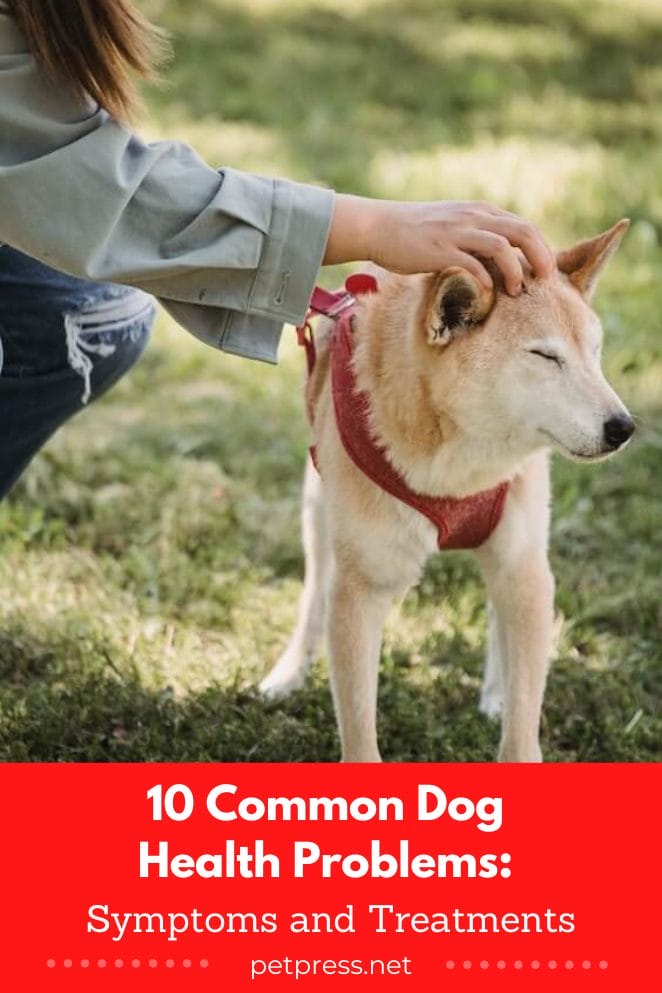
As a dog parent, you know how important it is to keep your pup healthy by keeping up to date with common dog health problems. But what does that mean exactly?
Sure, some breeds are healthier than others, but in general, all dogs need lots of love and care.
Through this Pettpress guide, we’ll explore the basics of dog health – from preventative care to recognizing signs and symptoms of illness.
Ready to become a star student in canine wellness? Let’s get started!
What are the Signs of an Unhealthy Dog?

Illness often starts with subtle signs. These top indicators are the ones that should not go unnoticed by any dog parent.
1. Unusual Lumps or Bumps:
If you notice any unusual lumps, bumps, or growths on your pup’s body, it could be a sign of a serious condition like cancer or skin disease. Don’t delay – bring them in for an evaluation from your vet as soon as possible.
2. Bad Breath:
When your dog has been eating something he shouldn’t have (like garbage!), his breath will let you know it! But if bad breath becomes more frequent and persistent, it can indicate dental issues or internal organ problems.
3. Excessive Itching & Scratching:
This can be caused by mites, fleas, allergies, dry skin – the list goes on and on. To determine the cause and provide proper treatment, head to the vet.
4. Discharge from Eyes or Nose:
This could be a sign of infection, so getting it checked out is essential. It’s important to get your pup diagnosed as soon as possible so they can start feeling better right away!
5. Not Eating:
If your dog isn’t eating as much as usual, it’s a sign that something may be wrong. From dental issues to cancer, there are lots of possibilities – so take them for a checkup at the vet immediately!
All dogs should have access to fresh water and food throughout the day, so if you notice any changes in their appetite, it’s time for a trip to the vet.
What is the most common health problem for dogs?

Listed below are the health issues that are most common in dogs along with their signs, symptoms, and treatments.
1. Fleas & Ticks:
These pesky little critters are the bane of any canine’s existence. If your pup has fleas and/or ticks, common signs will be itching, scratching, red bumps on their skin, and fur loss.
To treat these annoying pests, your veterinarian can recommend topical treatments or oral medications to help get rid of them quickly.
2. Ear Infections:
Pups with ear infections usually have symptoms such as head shaking, excessive ear wax production, an odor coming from the ears, and even some redness or swelling in the area.
Treatment for an ear infection depends on the severity and underlying cause; it is best to leave this one up to your veterinarian!
3. Allergies:
Allergies are one of the most common health problems in dogs. Common signs of allergies include itchy skin, redness or bumps on the skin, and scabs.
Treating allergies usually involves identifying the allergen and then using anti-itch medications or allergy shots to help reduce symptoms.
4. Gastritis:
This is an inflammation of the stomach lining that can be caused by a number of factors such as poor diet, food intolerance/sensitivity, bacterial infection, and more.
Common signs include vomiting, diarrhea, and loss of appetite.
Treatment for gastritis typically includes dietary changes and medications prescribed by your veterinarian.
5. Urinary Tract Infections (UTIs):

These are infections that occur in the urinary tract and can be caused by bacteria, fungi, or parasites.
Common signs of a UTI are abnormalities in urination such as frequency, urgency, and pain.
Treatment involves antibiotics prescribed by your vet to help clear up the infection quickly.
6. Diabetes:
This is a common health problem for dogs that is caused by an inability to produce enough insulin or effective use of what is produced.
Common symptoms include increased thirst and urination, weight loss, and lethargy.
Treatment includes diet changes, regular exercise, and medications prescribed by your veterinarian to help manage blood sugar levels.
7. Arthritis:
This condition causes inflammation in the joints which leads to stiffness, pain, lameness, and difficulty moving around.
Treating arthritis typically involves pain medications, joint supplements, and physical therapy to help keep the joints healthy.
8. Heart Disease:
Heart disease is a broad term used to describe different types of diseases that affect the heart. Common signs include difficulty breathing, coughing, fatigue, and loss of appetite.
Treatment depends on the type and severity of heart disease; it is best to see your veterinarian as soon as possible if you suspect your pup has this condition.
9. Skin Conditions:
Skin conditions are common in dogs and can be caused by allergies, infections, or other medical issues. Common signs include rashes, bumps, redness, and itching all over the body.
Treating skin conditions usually involve diagnosing the underlying cause followed by medications or dietary changes prescribed by your veterinarian.
10. Parasites:
Parasites are living organisms such as fleas and ticks that live off of their host’s body. Common signs include itching, scratching, and loss of fur.
Treatment usually involves topical or oral medications prescribed by your veterinarian to help get rid of the parasites quickly and safely.
Conclusion

No matter what health problems your pup might be facing, it is important to consult with your veterinarian for the best treatment plan!
Keeping your dog healthy can add years to their life and lots of wags to their tails!
Remember, our four-legged friends can’t tell us what’s wrong – so it’s up to us to watch for signs that something might be amiss.
If you ever suspect your dog isn’t feeling their best, don’t hesitate – get them checked out! And always remember: a healthy pup is a happy pup! 🙂
- 7 Dog Breeds With Webbed Feet And Why Do They Have Them - July 19, 2023
- 10 Best Fish For Small Tanks That Make Perfect Pets - July 18, 2023
- How to Breed Guinea Pigs: A Detailed Guide - July 17, 2023


GIPHY App Key not set. Please check settings